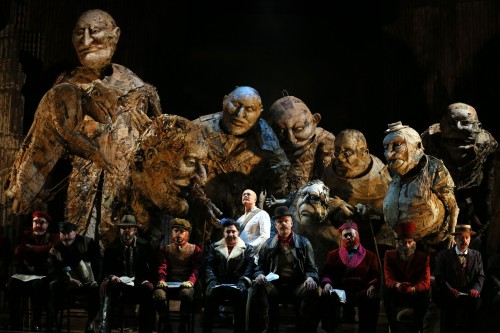 United Kingdom Glass, Satyagraha (sung in Sankrit): Soloists, Chorus & Orchestra of English National Opera / Karen Kamensek (conductor). London Coliseum, London, 1.2.2018. (CC)
United Kingdom Glass, Satyagraha (sung in Sankrit): Soloists, Chorus & Orchestra of English National Opera / Karen Kamensek (conductor). London Coliseum, London, 1.2.2018. (CC)

Cast:
Toby Spence – M. K. Gandhi
Charlotte Beament – Miss Schlesen
Anna-Clare Monk – Mrs Naidoo
Stephanie Marshall – Kasturbai
Nicholas Folwell – Mr Kallenbach
Sarah Pring – Mrs Alexander
Eddie Wade – Prince Arjuna
Clive Bayley – Parsi Rustomji
Andri Björn Róbertsson – Lord Krishna
Production:
Director – Phelim McDermott
Associate Director & Set Designer – Julian Crouch
Revival Producer – Peter Relton
Costumes – Kevin Pollard
Lighting – Paule Constable
Video – Leo Warner, Mark Grimmer (Fifty Nine Productions)
Last seen at the Coliseum in 2013 with Alan Oke as Gandhi (see my review), this is the latest (pardon the pun) incarnation of Glass’ magnificent edifice of an opera. Satyagraha had its UK performance here in London, at the Coliseum, in 2007. Gandhi here is replaced by the superb Toby Spence; Stuart Stratford, the conductor in 2013, is replaced by Karen Kamensek, who recently conducted Akhnaten for ENO (review) and who conducted the Shankar/Glass late night Prom in 2017 (review). Once more, there are no surtitles and the piece is sung in Sanskrit, a powerful distancing effect. We follow the ‘story’ (such as it is; there are plenty of dramatically static scenes) through a combination of what we see on stage and occasional projections of English on the back of the stage; scene changes are similarly labeled via projection.
Zeroing in on three major individuals who seem human versions of ‘satyagraha’ (truth-force) makes a powerful point: those three are Gandhi (specifically, in his time in South Africa and his relationship to the race laws), Tagore and Martin Luther King. All three characters are seen, but do not sing, hovering over the stage like an etheric presence. The chorus has an important part to play; less secure than in 2013, the force of their contributions was rather relaxed on this occasion. The orchestra, however, delivered throughout, brilliantly balanced by Kamensek, who was able to give passages the space they so require in this music. The final, ‘endless’ repetitions that close the opera were given with huge discipline and with no flagging of concentration. She is clearly a compelling force for orchestral players.
The sheer imagination behind Phelim McDermott’s staging is staggering (McDermott and the designer, Julian Crouch, are co-founders of the theatre company Improbable). One of the most striking images is in the final act, where Gandhi is centre-stage and behind him Martin Luther King repeats gestures, in true minimalist style, behind him (we see King from the back). A visual feast, the production actually mirrors the very grandeur of Glass’ conception. To write an opera on such ideals is not for the faint-hearted, and Glass meets the challenge head-on. A ‘skills ensemble’ acts out key scenes and actions during the course of the evening; one is still taken aback by what can be achieved on stilts, or how huge shapes can be manipulated; but it does not detract from Glass’ music, thankfully.
Toby Spence was a simply magnificent Gandhi. This was Spence’s first assumption of the role (it had previously been taken on each occasion since 2007 by Oke), something which gave it a freshness, and there was no sense of hesitation at any point. Despite a feeling of atemporality about Glass’ mode of expression, there is nevertheless a progression for the character of Gandhi, from lawyer to enlightened person, and in Spence’s reading we felt that journey especially keenly. At the other end of the scale, sadly, was Clive Bayley’s Parsi Rustomji, a role debut (incidentally, Bayley sang Aye in Akhnaten in 2016). Vocally fine, Bayley has a habit of stalking the stage like a pantomime villain (and not just in this opera); his character almost became cartoonish.
The role debutantes Anna-Clare Monk (Mrs Naidoo) and soprano Charlotte Beament (Gandhi’s secretary, Miss Schlesen) both distinguished themselves, while Sarah Pring, no stranger to the Coliseum, reprised Mrs Alexander with real confidence and vocal strength. The role of Krishna was taken by Andri Björn Róbertsson with panache; Eddie Wade reprised Arjuna creditably.
Glass has a huge total of operas under his belt and is showing no signs of stopping. Which leads to the question of which ones will posterity cherry-pick? Personally, Akhnaten strikes me as one of his very finest works; Einstein on the Beach for its heavenly length, perhaps. But Satyagraha, even given its distancing effects, seems to speak directly from Glass’ heart. This really is a remarkable, thought-provoking evening.
Colin Clarke
